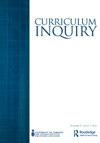从实践中学习:对酷儿包容性教学需求的概念化
IF 1.6
3区 教育学
Q2 EDUCATION & EDUCATIONAL RESEARCH
引用次数: 2
摘要
关于教师如何为女同性恋、男同性恋、双性恋、跨性别、酷儿和有问题的(LGBTQ+)青年组织更安全、更人性化的学习环境的学术讨论,通常与更广泛的教师教育文献中展开的讨论没有交集,特别是围绕学习教学中的实践意味着什么。在这篇文章中,我通过报告一个案例研究来弥合这一分歧,该案例研究旨在调查一位幼儿园老师如何制定包容酷儿的实践。通过包容酷儿的实践,我的意思是要实现两个教学目标:(1)在课程中包括LGBTQ +主题;(2)通过破坏规范来超越包容。基于教学是一项不确定且复杂的工作的假设,我利用酷儿和反压迫理论将需求概念化,作为一种生成透镜,用于调查教师在制定包括酷儿的实践过程中进行的谈判。在这项研究中,将这一视角引入,激发了不可预测性,即破坏常识的教学努力将对学习者和学习者以重复他们已经知道的方式学习的愿望产生什么影响。我的结论是,当教师将破坏性的、以正义为导向的实践作为教师和教师教育工作者需要驾驭的富有成效的问题空间时,需求的镜头就构成了教学挑战。本文章由计算机程序翻译,如有差异,请以英文原文为准。
Learning through practice: Conceptualizing the demands of queer-inclusive teaching
Abstract The scholarly conversation on preparing teachers to organize safer, more humanizing learning environments for lesbian, gay, bisexual, transgender, queer, and questioning (LGBTQ+) youth generally does not intersect with conversations unfolding in the broader teacher education literature, specifically around what practice means in learning to teach. In this article, I bridge that divide by reporting on a case study designed to investigate how one kindergarten teacher enacted queer-inclusive practice. By queer-inclusive practice, I mean to capture two pedagogical goals: (1) including LGBTQ + topics in curricula and (2) moving beyond inclusion by disrupting normativity. Grounded in the assumption that teaching is uncertain and complex work, I draw on queer and anti-oppressive theories to conceptualize demands as a generative lens for investigating what teachers negotiate during enactments of queer-inclusive practice. Bringing that lens to bear in this study animated the unpredictability of what pedagogical efforts to disrupt commonsense will do to learners and learners’ desires to learn in ways that repeat what they already know. I conclude that the lens of demands frames pedagogical challenges that arise when teachers enact disruptive, justice-oriented practices as a productive problem space for teachers and teacher educators to navigate.
求助全文
通过发布文献求助,成功后即可免费获取论文全文。
去求助
来源期刊

Curriculum Inquiry
EDUCATION & EDUCATIONAL RESEARCH-
CiteScore
3.10
自引率
17.60%
发文量
37
期刊介绍:
Curriculum Inquiry is dedicated to the study of educational research, development, evaluation, and theory. This leading international journal brings together influential academics and researchers from a variety of disciplines around the world to provide expert commentary and lively debate. Articles explore important ideas, issues, trends, and problems in education, and each issue also includes provocative and critically analytical editorials covering topics such as curriculum development, educational policy, and teacher education.
 求助内容:
求助内容: 应助结果提醒方式:
应助结果提醒方式:


